Isaiah 15 meaning explained in AI Summary
Isaiah Chapter 15 is a lament, a poem of mourning, for the nation of Moab. It describes the utter devastation and terror that will befall Moab and its people.
Moab's Destruction:
- Sudden and Swift: The chapter begins with the shocking news that Moabite cities like Ar and Kir will be destroyed in a single night. This suddenness emphasizes the overwhelming power of the destruction.
- Universal Grief: The entire nation is plunged into mourning. People flee to shrines, shave their heads, and wear sackcloth as outward signs of their grief and despair.
- Refugees and Devastation: The text paints a vivid picture of refugees fleeing through the countryside, their cries echoing through the land. Even the normally fertile land of Moab is described as desolate and withered.
- Military Defeat: Moab's mighty warriors are broken, their cries reaching as far as Zoar and Eglat-shelishiyah. The imagery suggests a complete and utter defeat.
Reasons for Judgment:
While the chapter doesn't explicitly state the reasons for Moab's judgment, it's understood within the broader context of Isaiah that their pride, idolatry, and opposition to God's people led to their downfall.
Themes:
- God's Judgment: The chapter serves as a stark reminder of God's power and his judgment against those who oppose him.
- The Futility of Human Strength: Moab, despite its fortifications and warriors, is powerless against God's judgment.
- Lament and Sorrow: The chapter is a powerful expression of grief and sorrow, highlighting the devastating consequences of sin and judgment.
Overall: Isaiah 15 is a somber chapter filled with vivid imagery of destruction and despair. It serves as a warning to all nations, reminding them of the consequences of turning away from God.
Isaiah 15 bible study ai commentary
This oracle against Moab is a prophetic lament, detailing the sudden, catastrophic, and total destruction of the nation. It unfolds as a vivid news report of a disaster in progress, moving from the fall of capital cities to the panicked flight of refugees and the weeping of the prophet himself. The chapter serves as a stark warning about the futility of human pride and military strength in the face of divine judgment, while also poignantly expressing God's sorrow in executing that judgment.
Isaiah 15 Context
Moab was a nation east of the Dead Sea, descended from Lot, Abraham's nephew (Gen 19:37), making them kin to Israel. Their history was intertwined with Israel's, marked by periods of conflict (Judg 3), suspicion (Num 22-24), and occasional alliance. Their national god was Chemosh. This prophecy is part of a series of oracles (Isaiah 13-23) against the nations surrounding Judah, demonstrating Yahweh's sovereignty not just over Israel but over the entire world. The prophecy likely foretells the devastation wrought by the expanding Assyrian empire in the 8th century BC, an instrument of God's judgment.
Isaiah 15:1
The oracle concerning Moab. Because in a night Ar of Moab is laid waste and brought to nothing; because in a night Kir of Moab is laid waste and brought to nothing.
In-depth-analysis
- Oracle: The Hebrew word is massa, meaning "burden." This is not just a message but a heavy, somber weight of divine judgment laid upon the prophet to deliver.
- In a night: This emphasizes the extreme suddenness and shock of the destruction. There is no long siege or protracted war; Moab's security is obliterated overnight, suggesting a swift, divinely orchestrated catastrophe rather than a purely human conquest.
- Ar and Kir: These were Moab's principal cities, likely representing the northern and southern capitals or major fortresses. Their simultaneous fall signifies the complete and immediate collapse of the entire nation's defenses and government.
Bible references
- Jeremiah 48:20: "...Proclaim it by the Arnon, that Moab is undone." (A parallel oracle repeating Moab's destruction).
- Numbers 21:28: "For fire went out from Heshbon, a flame from the city of Sihon. It devoured Ar of Moab..." (Recalls a prior destruction of Ar, establishing it as a key city).
- Amos 1:14-15: "...I will kindle a fire in the wall of Rabbah... their king shall go into exile..." (Shows the pattern of God's judgment against proud nations, including the fall of their capital).
Cross references
Zeph 2:9 (judgment on Moab's pride), Isa 17:14 (sudden destruction of enemies), 1 Th 5:2-3 (day of the Lord comes like a thief), Rev 18:8 (Babylon's plagues come in one day).
Isaiah 15:2
He has gone up to the temple and to Dibon, to the high places to weep; over Nebo and over Medeba Moab wails. On every head is baldness; every beard is shorn.
In-depth-analysis
- He: The singular pronoun refers to the entire nation of Moab, personified in its collective grief.
- Temple... high places: The people flee to their religious centers (the house of their god, Chemosh) for answers or protection, only to find them places of weeping. This highlights the failure of their idols. Dibon was a major Moabite city.
- Nebo and Medeba: These cities, prominent in the Moabite Mesha Stele, are now centers of lament. Mt. Nebo was also where Moses died overlooking the promised land he couldn't enter.
- Baldness... beard shorn: These were extreme, culturally understood signs of deep mourning, shame, and humiliation in the ancient Near East. This is not just sadness but a profound national disgrace.
Bible references
- Micah 1:16: "Make yourselves bald and cut off your hair, for the children of your delight..." (Identical imagery for intense mourning over loss).
- Jeremiah 41:5: "...men came... with their beards shaved and their clothes torn, and their bodies gashed..." (Shows this was a common, recognizable custom of severe grief).
- Jeremiah 48:37: "For every head is shaved and every beard cut off; upon all the hands are gashes, and on the loins is sackcloth." (An almost verbatim parallel in Jeremiah's oracle against Moab).
Cross references
Lev 21:5 (priests forbidden from such mourning), Deut 14:1, Job 1:20 (Job shaves his head in grief), Isa 22:12, Amos 8:10.
Polemics
The Moabites run to the "house" (bayith, which can also mean temple) and the high places of their god, Chemosh, but all they can do there is weep. The prophecy implicitly mocks the powerlessness of Chemosh to save his own people and cultic centers. Their religious acts are now only acts of desperation and mourning, not of worship that brings deliverance.
Isaiah 15:3
in his streets they wear sackcloth; on the housetops and in the squares everyone wails and melts in tears.
In-depth-analysis
- Sackcloth: A coarse, uncomfortable garment made of goat hair, worn to express mourning or deep repentance. Here, it is worn publicly in the streets, showing that the grief is universal.
- Housetops and squares: The mourning is not private but a public, community-wide spectacle. Housetops were flat roofs used for various activities and were highly visible places for public proclamations or lament.
- Melts in tears: This powerful metaphor describes a state of uncontrollable weeping and utter despair, where a person's composure completely dissolves into sorrow.
Bible references
- Jonah 3:6-8: "The king of Nineveh... covered himself with sackcloth... Let everyone call out mightily to God." (Sackcloth as a sign of communal repentance and grief).
- Jeremiah 9:1: "Oh that my head were waters, and my eyes a fountain of tears, that I might weep day and night..." (The prophet expresses a desire for the kind of unending grief Moab is now experiencing).
- Esther 4:1, 3: "When Mordecai learned... he... put on sackcloth and ashes... and in every province... there was great mourning among the Jews..." (Demonstrates sackcloth and wailing as a standard response to catastrophe).
Cross references
Joel 2:12-13 (rent your heart, not garments), Job 2:8 (Job in sackcloth), Psa 6:6.
Isaiah 15:4
Heshbon and Elealeh cry out; their voice is heard as far as Jahaz. Therefore the armed men of Moab cry aloud; his soul trembles within him.
In-depth-analysis
- Heshbon and Elealeh... to Jahaz: The sound of wailing spreads geographically across the land, from cities in the north (Heshbon, Elealeh) to one further south (Jahaz), illustrating how the panic and sorrow have engulfed the entire nation.
- Armed men of Moab cry aloud: The elite soldiers, the very symbol of Moab's strength and security, are now overcome with terror and weeping. Their courage is broken. This signifies the total psychological collapse of the nation.
- His soul trembles: The terror is not merely external fear but an internal, spiritual crisis. The collective "soul" of Moab is shaking, showing the depth of their despair.
Bible references
- Jeremiah 48:34: "From the outcry of Heshbon to Elealeh, as far as Jahaz they utter their voice..." (A direct and nearly identical parallel in Jeremiah's oracle).
- Deuteronomy 28:65-67: "...the LORD will give you a trembling heart... In the morning you shall say, ‘If only it were evening!’ and at evening you shall say, ‘If only it were morning!’" (The curse for disobedience includes the psychological terror Moab now experiences).
- Joshua 5:1: "...when all the kings of the Amorites... heard that the LORD had dried up the waters of the Jordan... their hearts melted, and there was no longer any spirit in them..." (Shows how enemies' hearts fail when faced with God's power).
Cross references
Num 32:3 (Heshbon as desirable land), Isa 13:7-8 (hearts melting at the day of the Lord), Psa 55:4-5.
Isaiah 15:5
My heart cries out for Moab; her fugitives flee to Zoar, to Eglath-shelishiyah. For on the ascent of Luhith they go up weeping; on the road to Horonaim they raise a cry of destruction.
In-depth-analysis
- My heart cries out: A stunning shift in perspective. The prophet Isaiah, speaking for himself and reflecting the heart of God, expresses deep sorrow and empathy for the suffering enemy. Judgment is not delivered with glee but with grief.
- Fugitives flee to Zoar: The population has become refugees, fleeing south toward Zoar, the very town where Lot, their ancestor, found refuge from the destruction of Sodom and Gomorrah. The irony is thick: they are re-enacting their ancestral story of escape from divine judgment.
- Eglath-shelishiyah: This name literally means "a three-year-old heifer." This could be a place name, or a metaphor for Moab in its full strength and vitality, now running and lowing in distress like a lost calf.
- Ascent of Luhith... road to Horonaim: These are specific locations on the escape route, filled with people weeping as they flee, their path marked by a "cry of destruction."
Bible references
- Luke 19:41: "And when he [Jesus] drew near and saw the city, he wept over it." (Christ's sorrow over Jerusalem demonstrates that God grieves over the necessity of judgment).
- Jeremiah 9:10: "For the mountains I will take up a weeping and wailing... because they are burned up, so that no one can pass through..." (The prophet as a participant in the sorrow of judgment).
- Genesis 19:22: "Escape there [to Zoar] quickly... Therefore the name of the city was called Zoar." (Directly links Moab's flight to their ancestor Lot's escape).
Cross references
Rom 9:2-3 (Paul's anguish for his people), Jer 48:3-5 (parallel description of fugitives and weeping).
Isaiah 15:6
For the waters of Nimrim are a desolation; the grass is withered, the new growth fails, the verdure is no more.
In-depth-analysis
- Waters of Nimrim: A famously fertile and verdant area, likely a wadi or oasis, known for its pastures.
- Desolation... withered... fails: The destruction is not just military and social but also ecological. The very sources of life and prosperity for Moab have dried up, symbolizing the totality of God's curse upon the land. This rapid withering reinforces the "in a night" theme.
Bible references
- Joel 1:10-12: "The field is destroyed, the land mourns... the vine dries up; the fig tree languishes... surely joy has withered away from the children of man." (Connects divine judgment directly with ecological collapse and the drying of the land).
- Jeremiah 12:4: "How long will the land mourn and the grass of every field wither? For the evil of those who dwell in it..." (Sin is linked to the suffering of the land itself).
- Isaiah 33:9: "The land mourns and languishes; Lebanon is ashamed and withers..." (A common theme in Isaiah where judgment is reflected in nature).
Cross references
Isa 19:5-7 (drying of the Nile in the judgment of Egypt), Amos 1:2 (pastures of the shepherds mourn).
Isaiah 15:7
Therefore the wealth they have gained and what they have stored up they carry away over the Brook of the Willows.
In-depth-analysis
- Wealth... stored up: Moab's accumulated riches, the source of their pride (as noted in Jer 48:7), are now just portable burdens being carried away by desperate refugees.
- Brook of the Willows: Likely a wadi forming Moab's southern border with Edom (possibly the Wadi al-Hasa). Crossing it means they are abandoning their homeland entirely, with no hope of return. Their hoarded wealth cannot save their land; it can only be carried away in defeat.
Bible references
- Ezekiel 7:19: "They will throw their silver into the streets... Their silver and gold will not be able to deliver them in the day of the wrath of the LORD." (Shows the worthlessness of material wealth during divine judgment).
- Proverbs 11:4: "Riches do not profit in the day of wrath, but righteousness delivers from death." (A wisdom principle vividly illustrated by Moab's plight).
- Luke 12:20-21: "'Fool! This night your soul is required of you, and the things you have prepared, whose will they be?' So is the one who lays up treasure for himself and is not rich toward God." (Parallels the folly of trusting in stored wealth that is lost overnight).
Cross references
Isa 2:20 (idols of silver and gold cast away), Jer 48:36 (lament over lost riches), Jas 5:1-3.
Isaiah 15:8
For a cry has gone around the border of Moab; its wailing reaches to Eglaim, its wailing to Beer-elim.
In-depth-analysis
- Cry... around the border: This verse summarizes the geographical extent of the disaster. The sound of grief and terror has completely encircled the nation, leaving no part untouched.
- Eglaim and Beer-elim: These places likely mark the far extremities of Moabite territory. "Beer-elim" means "well of the mighty trees" or "well of heroes," perhaps an ironic name for a place now filled with wailing. The oracle has methodically mapped out the total sonic landscape of a nation's death throe.
Bible references
- Jeremiah 48:21-24: "Judgment has come... upon Dibon... and on all the cities of the land of Moab, far and near." (The parallel oracle in Jeremiah similarly lists cities to emphasize the comprehensive nature of the judgment).
Cross references
Amos 1:3-2:3 (oracles systematically name nations in a geographical pattern).
Isaiah 15:9
For the waters of Dimon are full of blood; for I will bring more upon Dimon, lions for those of Moab who escape, for the remnant of the land.
In-depth-analysis
- Dimon... full of blood: "Dimon" is a powerful, ominous play on the name of the city "Dibon" (v. 2). By changing one letter, the name is associated with dam, the Hebrew word for "blood," creating a grim pun. The slaughter is immense.
- I will bring more: The disaster is not over. God explicitly states his direct agency in adding further judgment. There will be no relief.
- Lions for those who escape: Lions are a biblical symbol for fierce, inescapable predators and instruments of divine judgment. Even the fugitives who think they have escaped the initial slaughter will be hunted down. There is no refuge for the "remnant," which is usually a term of hope but here is one of finality.
Bible references
- 2 Kings 17:25: "Therefore the LORD sent lions among them, which killed some of them." (God sent lions to judge the new inhabitants of Samaria for their idolatry).
- Amos 5:19: "...as if a man fled from a lion, and a bear met him; or went into the house and leaned his hand on the wall, and a serpent bit him." (Perfectly captures the theme of inescapable, sequential judgment).
- Jeremiah 5:6: "Therefore a lion from the forest shall strike them down, a wolf from the desert shall devastate them..." (Uses predatory animals as metaphors for the agents of divine judgment, Babylon).
Cross references
1 Kgs 13:24 (a lion kills the disobedient prophet), Rev 6:8 (Death and Hades given authority to kill by sword, famine, and wild beasts).
Isaiah chapter 15 analysis
- Prophetic Empathy: The most unique feature of this oracle is the prophet's personal grief ("My heart cries out for Moab"). This reveals that God's judgment is not rooted in vindictive anger but in sorrowful necessity. It distinguishes Yahweh from the capricious and cruel gods of the ancient world.
- Sovereignty over All Nations: By pronouncing judgment on Moab, Isaiah affirms that Yahweh's authority and moral law are not limited to Israel. He is the God of all nations and holds them all accountable, especially for pride (the reason for Moab's judgment, given in Isaiah 16:6).
- A Two-Part Oracle: This chapter is the first half of a single, continuous prophecy that extends through Isaiah 16. Chapter 15 focuses on the raw description of the disaster, while chapter 16 explains the reason (pride) and offers a sliver of counsel and a distant Messianic hope.
- Polemic against Chemosh: The entire chapter is an indirect polemic against Moab's national god. The people run to his temples and high places, only to find them places of weeping. Chemosh is silent and impotent to save his people from the night of terror and the "lions" sent by Yahweh. His defeat is as total as Moab's.
- The Reversal of Fortune: Moab was known for its wealth, strong cities, and pride. Isaiah systematically dismantles each of these. The strong cities fall overnight, the pride turns to humiliating weeping, and the wealth becomes a useless burden for fleeing refugees.
Isaiah 15 summary
Isaiah 15 is a swift and sorrowful prophetic oracle announcing the sudden, complete destruction of Moab. The prophecy depicts a nation plunged overnight from prideful security into universal panic and grief, with its defenses shattered, its people turned into weeping refugees, its land made desolate, and even its soldiers broken in spirit. In a striking turn, the prophet expresses personal anguish over Moab's fate, revealing God's own grief in judgment and leaving no doubt that there is no escape from His righteous verdict.
Isaiah 15 AI Image Audio and Video
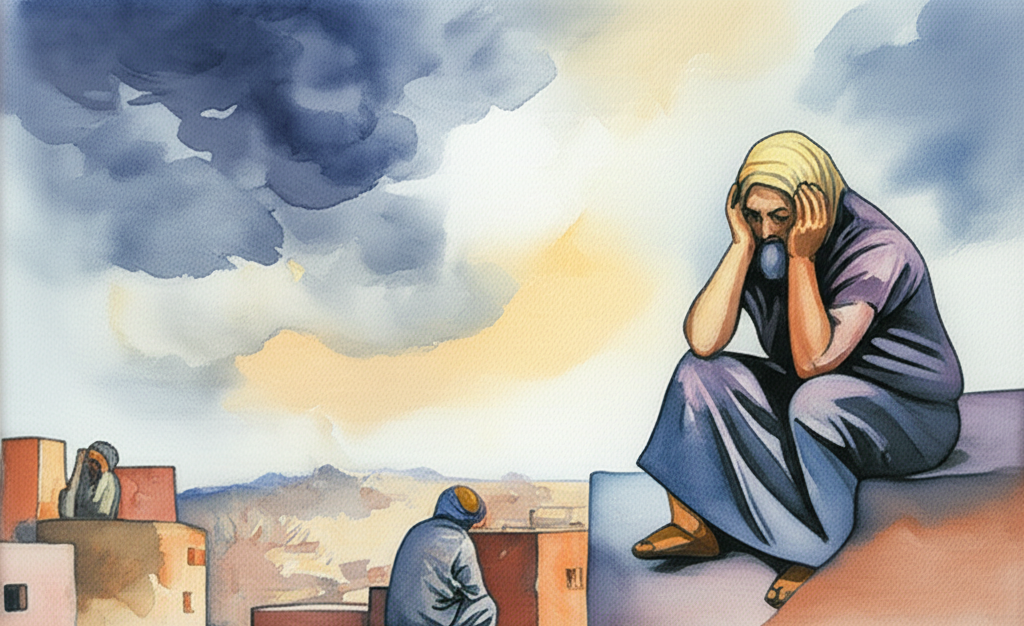


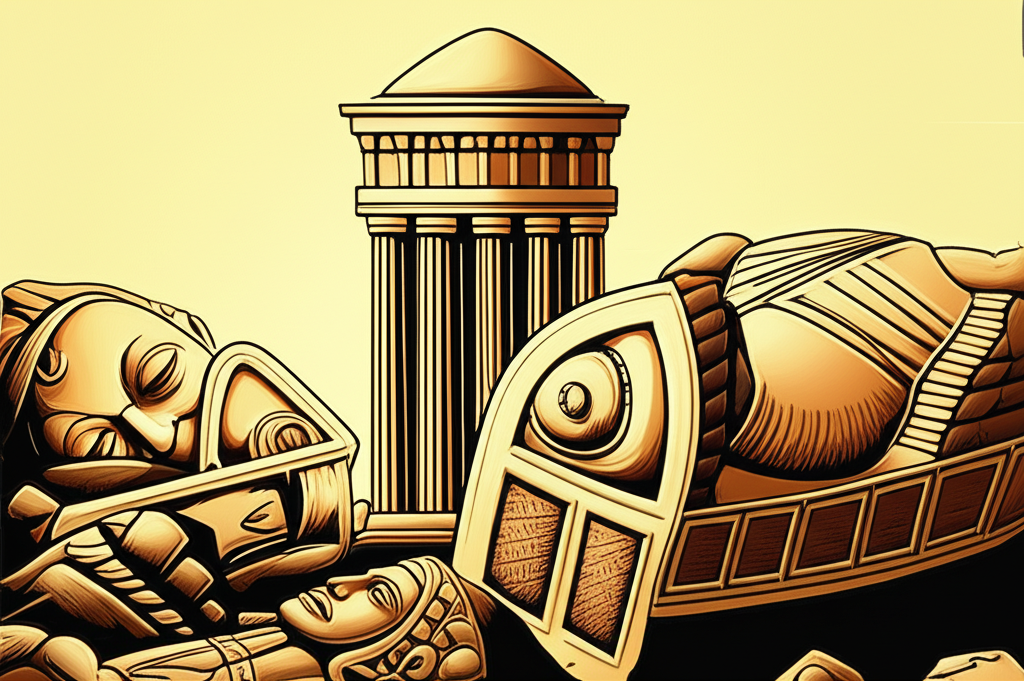
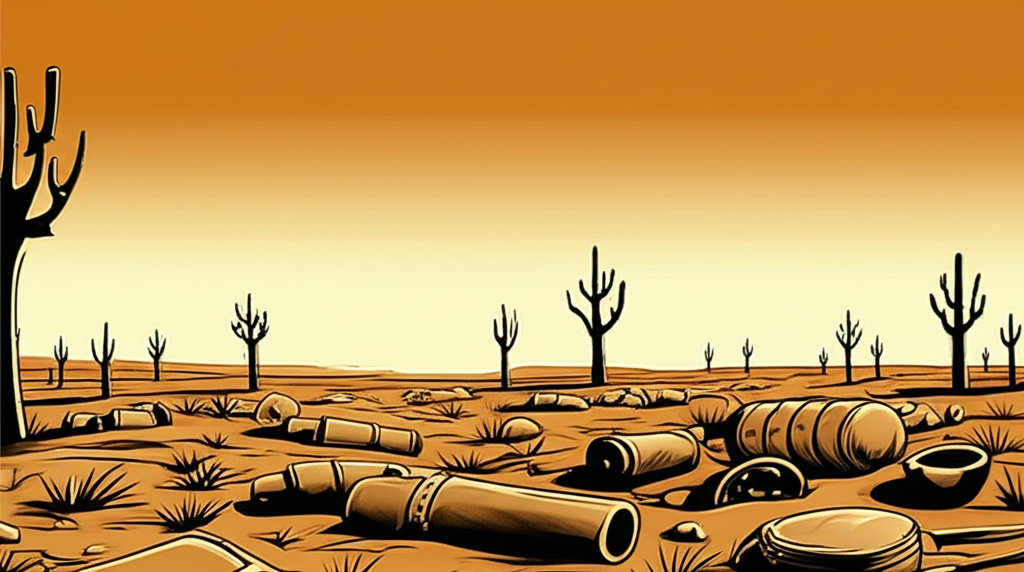
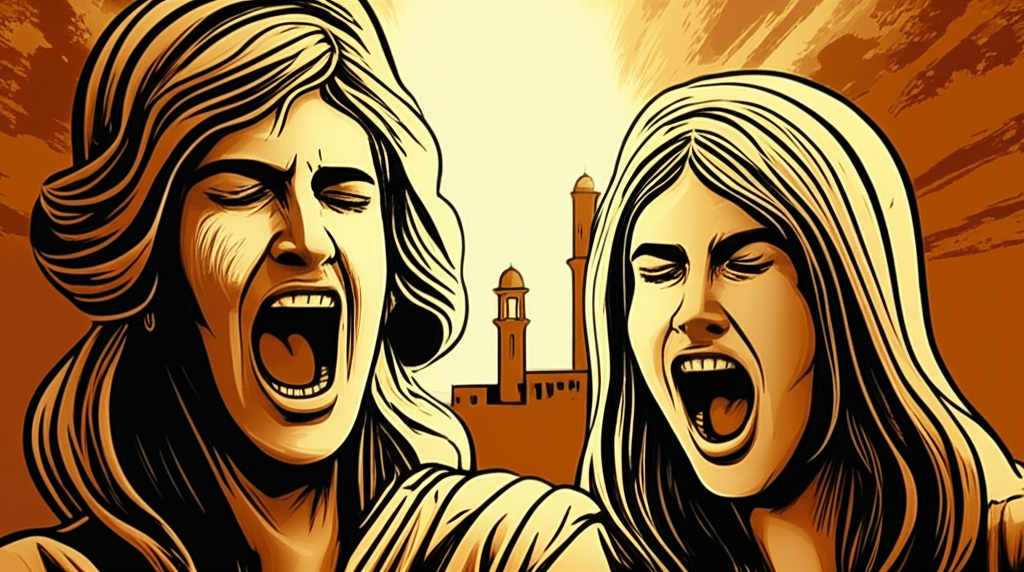


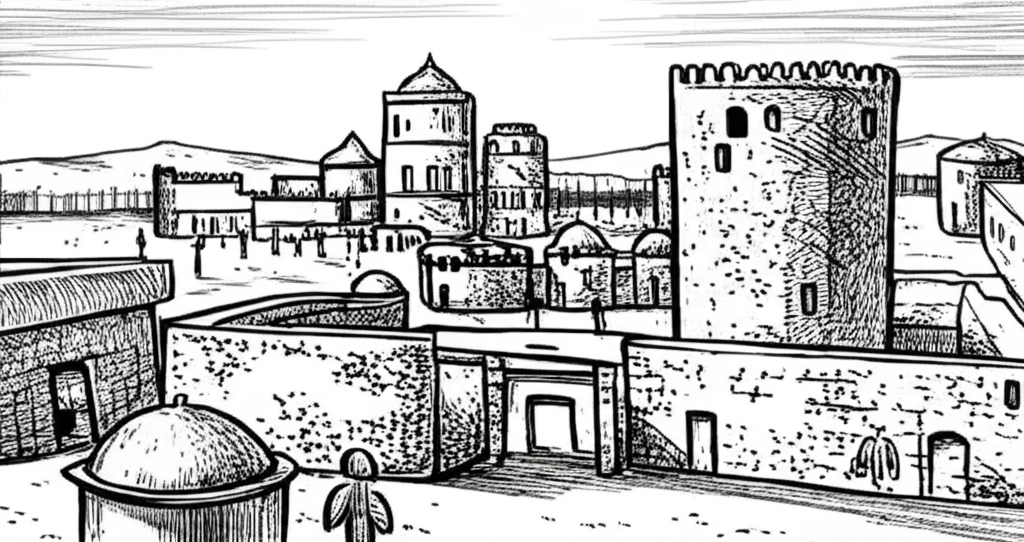
Isaiah chapter 15 kjv
- 1 The burden of Moab. Because in the night Ar of Moab is laid waste, and brought to silence; because in the night Kir of Moab is laid waste, and brought to silence;
- 2 He is gone up to Bajith, and to Dibon, the high places, to weep: Moab shall howl over Nebo, and over Medeba: on all their heads shall be baldness, and every beard cut off.
- 3 In their streets they shall gird themselves with sackcloth: on the tops of their houses, and in their streets, every one shall howl, weeping abundantly.
- 4 And Heshbon shall cry, and Elealeh: their voice shall be heard even unto Jahaz: therefore the armed soldiers of Moab shall cry out; his life shall be grievous unto him.
- 5 My heart shall cry out for Moab; his fugitives shall flee unto Zoar, an heifer of three years old: for by the mounting up of Luhith with weeping shall they go it up; for in the way of Horonaim they shall raise up a cry of destruction.
- 6 For the waters of Nimrim shall be desolate: for the hay is withered away, the grass faileth, there is no green thing.
- 7 Therefore the abundance they have gotten, and that which they have laid up, shall they carry away to the brook of the willows.
- 8 For the cry is gone round about the borders of Moab; the howling thereof unto Eglaim, and the howling thereof unto Beerelim.
- 9 For the waters of Dimon shall be full of blood: for I will bring more upon Dimon, lions upon him that escapeth of Moab, and upon the remnant of the land.
Isaiah chapter 15 nkjv
- 1 The burden against Moab. Because in the night Ar of Moab is laid waste And destroyed, Because in the night Kir of Moab is laid waste And destroyed,
- 2 He has gone up to the temple and Dibon, To the high places to weep. Moab will wail over Nebo and over Medeba; On all their heads will be baldness, And every beard cut off.
- 3 In their streets they will clothe themselves with sackcloth; On the tops of their houses And in their streets Everyone will wail, weeping bitterly.
- 4 Heshbon and Elealeh will cry out, Their voice shall be heard as far as Jahaz; Therefore the armed soldiers of Moab will cry out; His life will be burdensome to him.
- 5 "My heart will cry out for Moab; His fugitives shall flee to Zoar, Like a three-year-old heifer. For by the Ascent of Luhith They will go up with weeping; For in the way of Horonaim They will raise up a cry of destruction,
- 6 For the waters of Nimrim will be desolate, For the green grass has withered away; The grass fails, there is nothing green.
- 7 Therefore the abundance they have gained, And what they have laid up, They will carry away to the Brook of the Willows.
- 8 For the cry has gone all around the borders of Moab, Its wailing to Eglaim And its wailing to Beer Elim.
- 9 For the waters of Dimon will be full of blood; Because I will bring more upon Dimon, Lions upon him who escapes from Moab, And on the remnant of the land."
Isaiah chapter 15 niv
- 1 A prophecy against Moab: Ar in Moab is ruined, destroyed in a night! Kir in Moab is ruined, destroyed in a night!
- 2 Dibon goes up to its temple, to its high places to weep; Moab wails over Nebo and Medeba. Every head is shaved and every beard cut off.
- 3 In the streets they wear sackcloth; on the roofs and in the public squares they all wail, prostrate with weeping.
- 4 Heshbon and Elealeh cry out, their voices are heard all the way to Jahaz. Therefore the armed men of Moab cry out, and their hearts are faint.
- 5 My heart cries out over Moab; her fugitives flee as far as Zoar, as far as Eglath Shelishiyah. They go up the hill to Luhith, weeping as they go; on the road to Horonaim they lament their destruction.
- 6 The waters of Nimrim are dried up and the grass is withered; the vegetation is gone and nothing green is left.
- 7 So the wealth they have acquired and stored up they carry away over the Ravine of the Poplars.
- 8 Their outcry echoes along the border of Moab; their wailing reaches as far as Eglaim, their lamentation as far as Beer Elim.
- 9 The waters of Dimon are full of blood, but I will bring still more upon Dimon? a lion upon the fugitives of Moab and upon those who remain in the land.
Isaiah chapter 15 esv
- 1 An oracle concerning Moab. Because Ar of Moab is laid waste in a night, Moab is undone; because Kir of Moab is laid waste in a night, Moab is undone.
- 2 He has gone up to the temple, and to Dibon, to the high places to weep; over Nebo and over Medeba Moab wails. On every head is baldness; every beard is shorn;
- 3 in the streets they wear sackcloth; on the housetops and in the squares everyone wails and melts in tears.
- 4 Heshbon and Elealeh cry out; their voice is heard as far as Jahaz; therefore the armed men of Moab cry aloud; his soul trembles.
- 5 My heart cries out for Moab; her fugitives flee to Zoar, to Eglath-shelishiyah. For at the ascent of Luhith they go up weeping; on the road to Horonaim they raise a cry of destruction;
- 6 the waters of Nimrim are a desolation; the grass is withered, the vegetation fails, the greenery is no more.
- 7 Therefore the abundance they have gained and what they have laid up they carry away over the Brook of the Willows.
- 8 For a cry has gone around the land of Moab; her wailing reaches to Eglaim; her wailing reaches to Beer-elim.
- 9 For the waters of Dibon are full of blood; for I will bring upon Dibon even more, a lion for those of Moab who escape, for the remnant of the land.
Isaiah chapter 15 nlt
- 1 This message came to me concerning Moab: In one night the town of Ar will be leveled,
and the city of Kir will be destroyed. - 2 Your people will go to their temple in Dibon to mourn.
They will go to their sacred shrines to weep.
They will wail for the fate of Nebo and Medeba,
shaving their heads in sorrow and cutting off their beards. - 3 They will wear burlap as they wander the streets.
From every home and public square will come the sound of wailing. - 4 The people of Heshbon and Elealeh will cry out;
their voices will be heard as far away as Jahaz!
The bravest warriors of Moab will cry out in utter terror.
They will be helpless with fear. - 5 My heart weeps for Moab.
Its people flee to Zoar and Eglath-shelishiyah.
Weeping, they climb the road to Luhith.
Their cries of distress can be heard all along the road to Horonaim. - 6 Even the waters of Nimrim are dried up!
The grassy banks are scorched.
The tender plants are gone;
nothing green remains. - 7 The people grab their possessions
and carry them across the Ravine of Willows. - 8 A cry of distress echoes through the land of Moab
from one end to the other ?
from Eglaim to Beer-elim. - 9 The stream near Dibon runs red with blood,
but I am still not finished with Dibon!
Lions will hunt down the survivors ?
both those who try to escape
and those who remain behind.
- Bible Book of Isaiah
- 1 The Wickedness of Judah
- 2 The Mountain of the Lord
- 3 Judgment on Judah and Jerusalem
- 4 The Branch of the Lord Glorified
- 5 The Vineyard of the Lord Destroyed
- 6 Isaiah's Vision of the Lord
- 7 Isaiah Sent to King Ahaz
- 8 The Coming Assyrian Invasion
- 9 For to Us a Child Is Born
- 10 Judgment on Arrogant Assyria
- 11 The Righteous Reign of the Branch
- 12 The Lord Is My Strength and My Song
- 13 The Judgment of Babylon
- 14 The Restoration of Jacob
- 15 An Oracle Concerning Moab
- 16 Send the lamb to the ruler of the land, from Sela, by way of the desert, to the
- 17 An Oracle Concerning Damascus
- 18 An Oracle Concerning Cush
- 19 An Oracle Concerning Egypt
- 20 A Sign Against Egypt and Cush
- 21 Fallen, Fallen Is Babylon
- 22 An Oracle Concerning Jerusalem
- 23 An Oracle Concerning Tyre and Sidon
- 24 Judgment on the Whole Earth
- 25 God Will Swallow Up Death Forever
- 26 You Keep Him in Perfect Peace
- 27 The Redemption of Israel
- 28 Judgment on Ephraim and Jerusalem
- 29 The Siege of Jerusalem
- 30 Do Not Go Down to Egypt
- 31 Woe to Those Who Go Down to Egypt
- 32 A King Will Reign in Righteousness
- 33 O Lord, Be Gracious to Us
- 34 Judgment on the Nations
- 35 The Ransomed Shall Return
- 36 Sennacherib Invades Judah
- 37 Hezekiah Seeks Isaiah's Help
- 38 Hezekiah's Sickness and Recovery
- 39 Envoys from Babylon
- 40 Comfort for God's People
- 41 Fear Not, for I Am with You
- 42 The Lord's Chosen Servant
- 43 Israel's Only Savior
- 44 Israel the Lord's Chosen
- 45 The great king Cyrus
- 46 The Idols of Babylon and the One True God
- 47 The Humiliation of Babylon
- 48 Israel Refined for God's Glory
- 49 The Servant of the Lord
- 50 Israel's Sin and the Servant's Obedience
- 51 The Lord's Comfort for Zion
- 52 The Lord's Coming Salvation
- 53 Who has believed our report
- 54 The Eternal Covenant of Peace
- 55 The Compassion of the Lord
- 56 Salvation for Foreigners
- 57 Israel's Futile Idolatry
- 58 True and False Fasting
- 59 Evil and Oppression
- 60 Arise Shine for your light has come
- 61 The Spirit of the Lord is upon me
- 62 Zion's Coming Salvation
- 63 The Lord's Day of Vengeance
- 64 Oh that you would rend the heavens and come down, that the mountains might
- 65 Judgment and Salvation
- 66 The Humble and Contrite in Spirit